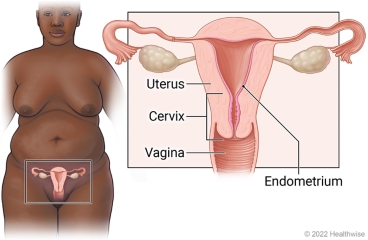
Overview
Postpartum endometritis is an infection of the lining of the uterus (endometrium) after you give birth. It is treated with antibiotics.
It is very important to treat this problem. If you don't, you can get a more serious infection. It could cause problems, such as scars on the pelvic organs. Rarely, the uterus has to be removed (hysterectomy).
Follow-up care is a key part of your treatment and safety. Be sure to make and go to all appointments, and call your doctor if you are having problems. It's also a good idea to know your test results and keep a list of the medicines you take.
How can you care for yourself at home?
- If your doctor prescribed antibiotics, take them as directed. Do not stop taking them just because you feel better. You need to take the full course of antibiotics.
- Rest until you feel better.
- Take an over-the-counter pain medicine, such as acetaminophen (Tylenol) or ibuprofen (Advil, Motrin). Read and follow all instructions on the label.
- Do not take two or more pain medicines at the same time unless the doctor told you to. Many pain medicines have acetaminophen, which is Tylenol. Too much acetaminophen (Tylenol) can be harmful.
- If you have belly pain, use a hot water bottle. Or you can use a heating pad set on low. Put a thin cloth between the heating pad and your skin.
- Do not have vaginal sex until your doctor says it's safe. Use pads instead of tampons.
When should you call for help?
Call 911 anytime you think you may need emergency care. For example, call if:
- You passed out (lost consciousness).
Call your doctor now or seek immediate medical care if:
- You have heavy vaginal bleeding. This means that you are soaking through one or more pads in an hour. Or you pass blood clots bigger than an egg.
- You are dizzy or lightheaded, or you feel like you may faint.
- You have a fever.
- You have new or worse pain in your belly or pelvis.
Watch closely for changes in your health, and be sure to contact your doctor if:
- Your vaginal bleeding seems to be getting heavier.
- You have new or worse vaginal discharge.
- You feel sad, anxious, or hopeless for more than a few days.
- You do not get better as expected.
Where can you learn more?
Go to http://www.healthwise.net/patientEd
Enter E897 in the search box to learn more about "Postpartum Endometritis: Care Instructions".
Current as of: July 15, 2025
Author: Ignite Healthwise, LLC Staff
Clinical Review Board
All Ignite Healthwise, LLC education is reviewed by a team that includes physicians, nurses, advanced practitioners, registered dieticians, and other healthcare professionals.

